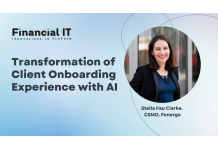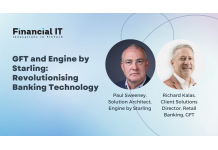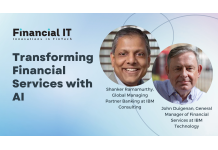Pioneering Global Payments: An Exclusive Q&A with Matthijs Boon, COO of Equals Money
- 17.07.2024 -- 08:45 am
- Matthijs Boon, Chief Operating Officer, Equals Money
Q&A Interview with Matthijs Boon, Chief Operating Officer at Equals Money Financial IT: In your view, what are the biggest trends shaping the future of global payments, and how is Equals Money positioned to capitalise on these trends? Matthijs Boon: The world is becoming increasingly global, with more businesses serving clients across diverse...
Transforming Client Lifecycle Management with AI
- 17.07.2024 -- 08:38 am
- Stella Fau Clarke, CSMO, Fenergo
Financial IT: Could you tell us more about how Fenergo leverages AI to enhance the client lifecycle management process? Stella Fau Clarke: Absolutely. Client lifecycle management is an area that significantly benefits from AI due to its complexity and time-consuming nature, which directly impacts the client experience. At Fenergo, we adopt a...
GFT and Engine by Starling: Revolutionising Banking Technology
- 01.07.2024 -- 10:08 am
- Paul Sweeney, Solution Architect at Engine by Starling, Richard Kalas, Client Solutions Director, Retail Banking, GFT
Financial IT caught up with Paul Sweeney, Solution Architect, Engine by Starling and Richard Kalas, Client Solutions Director, Retail Banking, GFT at Money20/20 Europe to discuss how they are modernising banking technology. Nodira Sadikova, Financial IT: Financial IT is thrilled to have two distinguished guests with us: Paul Sweeney, Solution...
Driving Innovation in Cross-Border Payments: An Interview with Roisin Levine of Wise
- 26.06.2024 -- 08:47 am
- Roisin Levine, Head of UK & Europe Partnerships , Wise
Interview with Roisin Levine, Head of UK & Europe Partnerships at Wise Financial IT: Since our last discussion at Money 20/20, can you provide an overview of the growth Wise Platform has experienced? Roisin Levine: We've grown a lot in the last few years. Ultimately, what Wise Platform is all about is providing the infrastructure...
Innovating Identity Verification: Insights from Trulioo's Steve Munford
- 26.06.2024 -- 06:58 am
- Steve Munford, CEO, Trulioo
Interview with Steve Munford, CEO, Trulioo Financial IT: Can you provide an overview of Trulioo's role in the global identity verification landscape and how it has evolved over the years? Steve Munford: We help customers digitally onboard businesses and consumers worldwide. Our product specifically assists with the KYC (Know Your Customer...
A Conversation with Tony Connolly, CEO of AccountsIQ
- 21.06.2024 -- 02:36 pm
- Tony Connolly, CEO, AccountsIQ
In a rapidly growing accounting software market – it is expected to hit $37.63 billion by 2032 – there is a real demand for mid-sized businesses to have the financial visibility and control needed to scale beyond basic accounting software without the complexity and cost of enterprise ERPs. In light of this, we sat down with Tony Connolly,...
Transforming Financial Services with AI: An Interview with IBM Leaders
- 21.06.2024 -- 10:03 am
- John Duigenan, General Manager of Financial Services at IBM Technology, and Shanker Ramamurthy, Global Managing Partner Banking, IBM Consulting
Nodira Sadikova, Multimedia Partner of Financial IT sat down with John Duigenan, General Manager of Financial Services at IBM Technology, and Shanker Ramamurthy, Global Managing Partner Banking at IBM Consulting to discuss how IBM is shaping the future of financial technology through its innovative AI solutions and strategic collaborations....
How Is Consumer Lending Evolving? A Conversation with Tom Eyre, Co-Founder of Loqbox
- 15.05.2024 -- 11:24 am
- Tom Eyre, Co-Founder and Co-CEO, Loqbox
Consumers are increasingly using financial products like Buy Now, Pay Later (BNPL) to pay for their goods and services. The FCA reported that 27% of UK adults (approximately 14 million people) used BNPL at least once in the six months prior to January 2023. This is up from 17% who said they had used it in the preceding 12 months in May 2022. As usage...


















